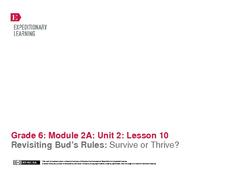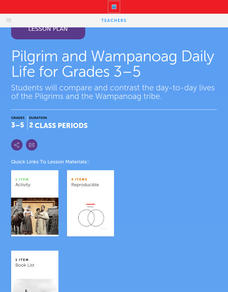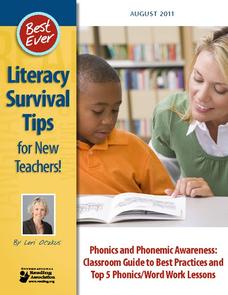EngageNY
Grade 5 Math Module 1, Topic D, Lesson 9
Introduces addition of decimals by using unit notation to represent the problem. Pupils use a place value chart to decompose the numbers and then add before connecting to the standard algorithm.
EngageNY
Grade 5 Math Module 1, Topic B, Lesson 5
There is more than one way to write a number. The lesson plan provides teachers with a way to teach reading and writing decimals to thousandths using standard, expanded, and unit forms. Pupils work through in-class and homework...
Scholastic
Voyage on the Mayflower for Grades 3-5
Following an online activity, scholars complete a Grafitti Wall in which small groups write words and phrases on chart paper pertaining to Pilgrims, the Mayflower, and Thanksgiving. Pupils perform a close reading then answer a series of...
Illustrative Mathematics
Hundred Chart Digit Game
Math games, especially in the primary grades, provide great opportunities for developing the number sense of young mathematicians. Working in pairs with a deck of single-digit cards, students take turns drawing two cards and reading the...
EngageNY
Mid-Unit 2 Assessment: On-Demand Informational Writing
Lesson 7 focuses on building academic vocabulary and writing an explanatory letter with supported textual evidence. For the first five minutes of the lesson, the educator reminds the class of how to read and refer to the accordion...
Math Learning Center
Second Grade Assessments and Scoring Checklists, Common Core State Standards
How are your second graders progressing in their math skills? Find out with a series of math assessment activities. With baseline assessment score sheets for each skill, you can track how well your kids are adding, subtracting, telling...
Noyce Foundation
Ducklings
The class gets their mean and median all in a row with an assessment task that uses a population of ducklings to work with data displays and measures of central tendency. Pupils create a frequency chart and calculate the mean and median....
Curated OER
Wide Mouthed Frog Memory or Wide Mouthed Frog Sight Word Game
How appropriate is playing a game of memory to help children memorize their sight words! Offering fun frog-themed flash cards and instructions for playing two different sight word games, this would make a great addition to the...
Scholastic
The First Thanksgiving Feast
Following an online activity, scholars listen to a read-aloud of If You Were at the First Thanksgiving by Anne Kamma. Pupils discuss their family traditions and complete a T-chart comparing the holiday then and now. Collages are made to...
Education World
The African American Population in US History
How has the African American population changed over the years? Learners use charts, statistical data, and maps to see how populations in African American communities have changed since the 1860s. Activity modifications are included to...
EngageNY
Revisiting Bud’s Rules: Survive or Thrive?
Bud followed a series of rules from Bud, Not Buddy by Christopher Paul Curtis. The question is, how did he use those rules to thrive or survive? After a grand discussion, class members explore the novel to locate and cite textual...
Curated OER
“The Story of an Hour” Extension Activities: Teacher’s Guide and Notes
Enhance and extend instruction of "The Story of an Hour" by Kate Chopin with one or all of these ideas. You might want to cover characterization and summary, or improve understanding of context clues and irony. You can cover any...
EngageNY
Analyzing Evidence: Writing about Theme
Class members prepare for the end-of-unit assessment by analyzing a writing prompt. They complete a Being Made Invisible anchor chart and write their thoughts about captives and invisibility on sticky notes. In addition, they discuss...
EngageNY
Revising for Organization: Timely Transitions
During the eighth lesson in a historical fiction unit, pupils practice thoughtfully transitioning their ideas sequentially. After the teacher models how to add these transitions using the Wheelwright draft created in a previous lesson,...
EngageNY
Introducing a Thematic Concept: Becoming Visible Again after Captivity
Share your thoughts. Scholars use Think-Pair-Share to answer questions related to Louie in Unbroken. The class completes the Becoming Visible Again anchor chart to understand the text's theme better. They write an example of Louie...
EngageNY
Local Sustainable Food Chain: Determining Cascading Consequences Using The Omnivore’s Dilemma
What are the consequences of the local, sustainable food chain? Research teams explore the question as they review Michael Pollan's The Omnivore's Dilemma. The teams complete Cascading Consequences charts and then choose research topics...
Scholastic
Pilgrim and Wampanoag Daily Life for Grades 3-5
Thirteen steps make up a lesson that challenges pupils to compare and contrast the daily lives of Pilgrims and the Wampanoag tribe. Learners revisit the Graffiti Wall then break into small groups for an investigative reading assignment...
EngageNY
Close Reading: Focusing on Taking a Stand (Chapter 2 cont.)
Scholars complete a close read of To Kill a Mockingbird and determine why characters take a stand. They use text-dependent questions and Note-catchers to help guide their thinking. Readers review the Taking a Stand Anchor chart and...
EngageNY
Key Incidents Reveal Aspects of Character: Survival at Sea (Pages 114-168)
Learn from experience. As part of their study of Unbroken, scholars use a turn-and-talk strategy to discuss Louie's experiences and the presence of God while he is lost at sea. They then read quotes from the text and infer what the words...
EngageNY
Analyzing Author’s Craft: Analyzing Hillenbrand’s Language Techniques
Young readers take a look at the conditional and subjunctive moods authors use. The Conditional and Subjunctive Mood handout defines the types of moods and gives them examples and practice. They then work with partners to identify...
EngageNY
Analyzing Events: Carlotta’s Journey
How does one talk silently? Class members participate in a silent communication activity known as a Chalk Talk. During the activity, they answer text-dependent questions analyzing Carlotta’s Journey. They use markers and chart paper to...
EngageNY
Writing an Introduction and Body Paragraph That Support an Opinion: Jackie Robinson’s Role in the Civil Rights Movement
It is all in the introduction. Class members first learn to write an introduction paragraph and body paragraphs to support it. They then work to create a Criteria for Writing Opinion Essays anchor chart.
Curriculum Corner
Roll, Read, and Color
Familiarize young readers with consonant digraphs using a collaborative phonics activity. Working in pairs, children take turns rolling a die and reading a word from the included chart that corresponds to the number they rolled....
International Reading Association
Literacy Survival Tips for New Teachers!
Whether new to teaching or a seasoned pro, this 12-page phonics and phonemic awareness guide is a must for your curriculum library. Everything from a summary of research on the topic to exercises and activities is included.























